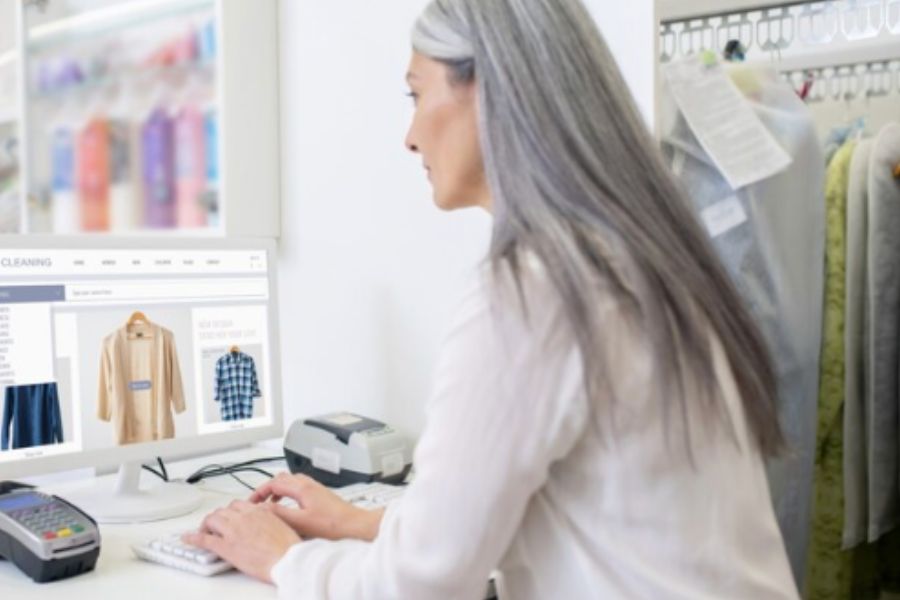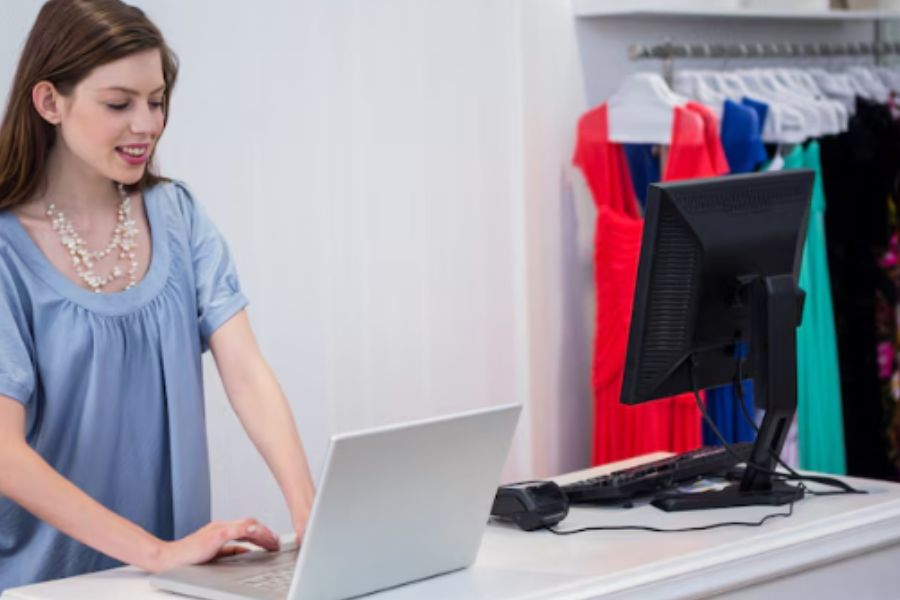The furniture store POS system is emerging as a pivotal tool for businesses aiming to streamline sales and boost profits in the dynamic landscape of retail today. A well-integrated and tailored POS holds the key to optimizing inventory management, enhancing the customer shopping experience, and ultimately maximizing revenue.
In this blog, we delve into the essential features and considerations that empower furniture retailers to navigate the intricacies of sales, inventory, and customer relations with finesse. Join us as we unravel the transformative potential of a dedicated furniture store POS system in the pursuit of operational excellence and financial success.
What is a Furniture Store POS System and Its Importance
A furniture store POS system is a specialized software and hardware solution designed to streamline and manage various aspects of retail operations within a furniture store. It serves as the central hub for processing sales transactions, managing inventory, tracking customer interactions, and generating reports.
The importance of a POS system lies in its ability to enhance efficiency, improve customer experience, and contribute to overall business growth. Here are key aspects of its significance:
- Transaction processing: A POS system expedites the checkout process, ensuring quick and accurate transactions. This is crucial in a furniture store where customers may make large and complex purchases.
- Inventory management: The POS system helps manage inventory in real-time, allowing store owners to monitor stock levels, track product movement, and optimize reorder processes. This minimizes instances of overstocking or stockouts.
- Customer Relationship Management (CRM): The POS system often integrates with CRM tools, enabling the collection and analysis of customer data. This information can be used to personalize interactions, provide targeted promotions, and enhance the overall customer experience.
- Sales reporting and analytics: Comprehensive reporting features provide insights into sales trends, popular products, and customer preferences. This data empowers business owners to make informed decisions, optimize pricing strategies, and identify growth opportunities.
- Multi-channel integration: For furniture stores with both physical and online presence, a POS system can integrate with e-commerce platforms, ensuring a seamless and unified shopping experience for customers across various channels.
- Employee management: The POS system can assist in managing employee schedules, monitoring performance, and tracking commissions. This contributes to a well-organized and motivated workforce.
- Security and fraud prevention: The system enhances security by processing transactions securely and providing features such as user authentication. This helps prevent fraud and protects sensitive customer information.
- Adaptability to business growth: A robust POS system is scalable and can adapt to the changing needs and size of the furniture store. This is essential for businesses looking to expand and grow.
Generally, a furniture store POS system is a vital tool for business survival and growth. By automating and optimizing various operational aspects, it allows furniture retailers to provide better service, make informed decisions, and stay competitive in a dynamic market. The integration of technology not only enhances the overall efficiency of the business but also contributes to a positive and modern shopping experience for customers.
Benefits of Using a Furniture Store POS System
Regardless of whether you’re running a small business or overseeing a large corporation, opting to invest in software designed for retail furniture stores is a strategic decision that can substantially streamline your operational procedures and bolster your overall profitability. The adoption of such software programs for furniture stores provides a multitude of advantages, guaranteeing that your business processes become more streamlined and impactful.
Here are some benefits you can expect when integrating these software solutions into your retail framework.
Simple Inventory Control
Efficient inventory management is a cornerstone of successful furniture retail. A furniture store POS system provides real-time insights into inventory levels, preventing stockouts and overstock situations. This helps businesses maintain a balanced and optimized inventory, reducing costs and increasing overall profitability.
Improved Sales Evaluation
Understanding sales performance is vital for making informed business decisions. A quality POS system for furniture stores offers detailed sales reports, enabling businesses to analyze product performance, identify trends, and strategize for future success.
High Customer Retention Rate
Customer satisfaction and loyalty are paramount in the highly competitive furniture retail sector. A POS system facilitates personalized customer experiences, from tailored promotions to efficient order processing.
Integration of E-commerce Platforms
In the era of online shopping, integration with e-commerce platforms is non-negotiable for furniture retailers. A Furniture Store POS system seamlessly integrates with various e-commerce channels, providing a unified experience for customers and streamlining backend operations.
Simple Payment Processing
A user-friendly payment processing system is essential for enhancing the overall shopping experience. A furniture store POS system simplifies payment processing, offering various payment options, and ensuring secure transactions.
User-Friendliness
Adopting a user-friendly POS system is crucial for its successful implementation. A system that is easy to learn and navigate ensures that staff can quickly adapt, minimizing training costs and optimizing operational efficiency.
Kinds of Furniture Store System: Furniture Retailer Solutions
Considering the vast array of furniture store software options in the market, selecting the right one may seem daunting. Nevertheless, through a meticulous assessment of your business requirements, you can pinpoint furniture retailer solutions that align with your needs and contribute to the advancement of your business.
Furniture Store POS Software
At the heart of every successful furniture store lies an efficient Point of Sale (POS) system. This software not only facilitates seamless transactions but also serves as the nerve center for inventory management. Retailers benefit from real-time updates on stock levels, sales data, and customer preferences. With features like integrated payment processing and sales tracking, furniture store POS software streamlines daily operations, allowing businesses to focus on providing exceptional customer service.
Notable examples in the market, such as ConnectPOS, offer customizable solutions tailored to the unique needs of furniture retailers.
Applications for Product Visualization and Configuration
In the digital age, consumers seek immersive shopping experiences, especially when it comes to furniture. Applications for product visualization and configuration have emerged as game-changers, enabling customers to virtually place furniture items within their living spaces before making a purchase. This not only enhances the buying process but also reduces the likelihood of returns.
Leading solutions like Augmented Reality (AR) apps and 3D configurators empower customers to visualize how a sofa or dining set fits into their home, significantly influencing their purchasing decisions.
E-commerce Platforms
The advent of e-commerce has reshaped the retail landscape, and furniture is no exception. E-commerce platforms provide furniture retailers with a global reach, allowing them to showcase their products to a broader audience. From established platforms like Shopify and WooCommerce to specialized furniture marketplaces, retailers have a plethora of options to establish their online presence.
These platforms not only facilitate transactions but also offer tools for marketing, analytics, and customer engagement, contributing to the overall success of furniture businesses in the digital space.
Warehouse Management Systems (WMS)
Efficient warehouse management is critical for furniture retailers dealing with a vast inventory of various shapes and sizes. Warehouse Management Systems (WMS) play a key role in optimizing logistics, inventory tracking, and order fulfillment. Automation features, such as barcode scanning and real-time inventory updates, enhance accuracy and speed in warehouse operations.
Examples like Oracle NetSuite and SAP EWM provide comprehensive WMS solutions, ensuring that furniture retailers can manage their inventory seamlessly and deliver a swift and reliable service to customers.
Customer Relationship Management (CRM) Tools
Building and maintaining strong customer relationships is fundamental in the furniture retail business. Customer Relationship Management (POS CRM) tools enable retailers to centralize customer data, track interactions, and personalize communication. By understanding customer preferences, retailers can provide targeted promotions, loyalty programs, and exceptional customer service.
Notable CRM solutions like Salesforce and HubSpot offer features specifically tailored to the unique challenges faced by furniture retailers, helping them create lasting connections with their clientele.
Enterprise Resource Planning (ERP) Software
For holistic management of business processes, furniture retailers turn to Enterprise Resource Planning (ERP) software. ERP integrates various aspects of a business, including inventory management, financials, human resources, and more. This integration streamlines operations, reduces inefficiencies, and provides a comprehensive view of the entire business.
Leading ERP solutions like Microsoft Dynamics and SAP ERP offer scalable and customizable solutions suitable for furniture retailers of all sizes, ensuring a cohesive and efficient workflow.
The Best Furniture Store POS System to Help Streamline Sales and Boost Profits
ConnectPOS
ConnectPOS emerges as a powerhouse in the realm of furniture store POS solutions. Tailored to meet the specific needs of furniture retailers, ConnectPOS boasts a user-friendly interface and advanced functionalities that enhance the overall shopping experience. Its adaptability makes it suitable for both small boutiques and large showroom operations.
Furthermore, ConnectPOS stands out as a cost-effective solution, offering a fraction of the price while still delivering essential POS features. The platform provides a generous 14-day free trial, allowing users to experience its capabilities firsthand. If satisfied with the trial, users can seamlessly subscribe to a plan. The pricing plans, prominently displayed on the website, are transparent and easy to understand, devoid of any hidden fees.
Retailers have the flexibility to commence with the Standard plan, priced at US$49 per month for monthly payments or US$39 per month for annual commitments.
Additionally, a Custom plan is available, enabling retailers to tailor their POS system according to their specific requirements and budget. This approach allows retailers to “DIY” their own POS system, creating a solution that perfectly aligns with both their operational needs and financial considerations.
Here are some key features you can refer to:
- Seamless transaction processing: ConnectPOS ensures smooth and efficient transactions, minimizing wait times and enhancing customer satisfaction.
- Inventory management: The system provides real-time updates on inventory levels, helping retailers stay on top of stock and reduce the risk of over or understocking.
- Customer engagement: ConnectPOS facilitates personalized interactions, allowing retailers to understand and cater to customer preferences effectively.
Lightspeed Retail POS
Lightspeed Retail POS stands out as a comprehensive solution for furniture stores. Its intuitive design and feature-rich platform empower retailers to manage their operations efficiently. Lightspeed Retail POS is designed to grow with businesses, from inventory tracking to customizable reporting.
It offers a total of 5 pricing plans, enhancing flexibility and convenience for merchants. These plans are categorized as Basic, Starter, Standard, Advanced, and Pro. Starting at just US$69 per month, the Basic plan provides access to fundamental features. If you find the basic functionalities insufficient, there is the option to upgrade your plan to access more advanced features and capabilities.
Here are the best key features:
- Scalability: Lightspeed Retail POS adapts to the evolving needs of furniture businesses, making it a suitable choice for both startups and established retailers.
- Inventory tracking: The system offers robust inventory management features, allowing retailers to monitor stock levels, track product movement, and optimize replenishment strategies.
- Customizable reporting: Lightspeed Retail POS provides in-depth analytics, enabling businesses to make informed decisions based on sales trends and customer behavior.
Quickbooks POS
Quickbooks POS is renowned for its seamless integration capabilities, making it a preferred choice for furniture retailers seeking an all-encompassing solution. The system simplifies transaction processing, inventory tracking, and financial management, contributing to a streamlined retail operation.
When it comes to pricing plans, Quickbooks stands out from most other POS systems by providing a full license purchase option. While this one-time purchase may initially make Quickbooks POS seem relatively expensive, it eliminates the need for a recurring monthly fee after the initial purchase.
Below are some features of Quickbooks POS:
- Integration capabilities: Quickbooks POS seamlessly integrates with various business tools, providing a centralized platform for comprehensive management.
- Transaction processing: The system simplifies the checkout process, ensuring quick and accurate transactions that enhance the overall customer experience.
- Financial management: Quickbooks POS assists in tracking sales, managing expenses, and generating financial reports, offering a holistic view of the business’s financial health.
Vend POS
Vend POS distinguishes itself with its cloud-based architecture, offering flexibility and accessibility to furniture retailers. Real-time inventory updates and customer relationship management tools make Vend POS a powerful ally for businesses looking to provide a personalized shopping experience.
On its website, Vend POS presents pricing plans in seven different currencies for the convenience of its audience. Business owners and operators can choose from three primary plans offered by Vend POS: Lite at US$99, Pro at US$129, or can request a quote for the Enterprise plan.
Here are some key features of Vend POS:
- Cloud-based accessibility: Vend POS allows retailers to access critical data from anywhere, providing flexibility in managing operations.
- Real-time inventory updates: The system ensures that retailers have accurate and up-to-date information on stock levels, minimizing the risk of discrepancies.
- Customer relationship management: Vend POS facilitates personalized interactions, allowing retailers to build lasting relationships with their customer base.
Hike POS
Hike POS is celebrated for its user-friendly interface and robust features tailored for retail environments, including furniture stores. Hike POS streamlines sales processes, enhances customer interactions, and integrates seamlessly with e-commerce platforms.
You have the opportunity to explore a complimentary 14-day trial. Following that period, if you decide to proceed, Hike POS provides three pricing plans, each accompanied by various optional add-ons.
Here are key features:
- User-friendly interface: Hike POS is designed for ease of use, minimizing training requirements and ensuring a smooth transition for staff.
- Sales process optimization: The system streamlines the sales process, from transaction processing to order fulfillment, ensuring efficiency in every aspect.
- Omnichannel integration: Hike POS seamlessly integrates with e-commerce platforms, providing a cohesive experience for customers whether they shop in-store or online.
FAQs: Furniture Store POS System
Can Furniture Store POS Software Integrate with Other Systems?
Yes, most modern POS systems are designed to integrate seamlessly with other business systems, including accounting software, e-commerce platforms, and customer relationship management tools.
Is the Furniture Store POS Software User-Friendly?
The user-friendliness of POS software varies, but reputable systems prioritize ease of use. Training programs and ongoing support are often provided to ensure smooth adoption by store staff.
Is it Possible to Manage Multiple Stores with Furniture Store POS Software?
Yes, many advanced POS systems for furniture stores offer multi-store management capabilities. This enables centralized control over inventory, sales, and customer data across multiple locations.
Conclusion
In conclusion, adopting a furniture store POS system is a strategic move for furniture retailers aiming to streamline sales processes and boost profits. The benefits, ranging from simple inventory control to enhanced customer retention, make these systems indispensable in the competitive retail landscape. By choosing the right type of system and exploring top-rated solutions like ConnectPOS, Lightspeed Retail POS, Quickbooks POS, Vend POS, and Hike POS, furniture stores can position themselves for sustained success in the dynamic world of retail.
If you are looking for the best POS for your business, don’t hesitate to contact us for advice and support.



